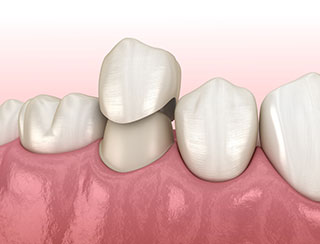Many of our patients have questions about what dental crowns are, what the procedure entails, and if this is the best solution for the treatment of their current oral health situation. In this article we will go over the ins and outs of a dental crown treatment and if it is the correct option for you. First of all, what exactly is a dental crown?

What is a Dental Crown?
A dental crown, also known as a dental cap, is a tooth restoration that completely covers or caps a tooth to strengthen and preserve it. A crown may be needed when a large cavity or break threatens the health and stability of a patient’s tooth. The crown is bonded to a tooth that has been properly prepared with dental cement.
Can I Get a Dental Filling Instead?
Other options than a dental crown are available to all of our patients at Hillside Dental. For example, you may and our dentist may agree to opt for a dental filling instead. Dental fillings can sometimes be a better solution than a crown depending on the amount of filling needed to preserve the tooth. Crowns become the best option when the filling makes up 50% of a tooth or more because of a cavity and decay. Fillings that exceed this limit would be a bad option because they leave the tooth weakened and vulnerable to breakage or cracking. Eventually, and in the near future, it will be likely you will need a crown.
What to Expect During a Dental Crown Procedure?
This procedure will usually take two scheduled dental visits to properly install the crown. This will ensure that the restored tooth will last a long time to come, preventing any more costly visits in the future such as with tooth extraction and dental implant.
First Visit
The first appointment begins with an examination and dental crown consultation. The dentist will closely inspect the tooth roots and the surrounding bone with X-rays to make sure this is the patient’s best option.
A local anesthetic will then be given around the tooth and gum tissue. Preparation fo the tooth is then undertaken by properly reshaping it for the crown placement. This means there will be a reduction in the top biting surface of the tooth.
After this, the dentist will take impressions of both your lower and upper dental arches in order to design the crown for the most comfortable and natural bite. The dentist will also match the exact shade of your teeth so that the new crown will blend in seamlessly with the rest of your teeth.
The impressions will be sent to a lab to create a custom crown fitted specifically for each patient. This process will take up to two weeks, meanwhile, you will be given a temporary crown to cover and protect your tooth that is being treated.
Second Visit
On the second appointment, your permanent dental crown will be bonded to the tooth with special cement. The dentist will again numb the surrounding tissue with an anesthetic, clean your teeth, and remove the temporary crown. The dental crown will be placed in the desired location and tested for the perfect fit. The dental crown will then be cemented in place and allowed to harden.
Dental Crown Aftercare
Your aftercare regimen for a permanent dental crown will begin immediately after the procedure. For the first 24-48 hours you should avoid any sticky foods or other actions that might damage or dislodge the drown.
After this time period, the crown properly hardened and firmly cemented to the tooth. You may then treat the tooth as if it is your natural one. Any sensitivity of the tooth will go away after a couple of days. If you are still experiencing sensitivity after that time you need to call our dental office in Northeast El Paso to talk with our doctor who will know the proper course of action to take.
Is a Dental Crown My Best Option?
You may still be asking yourself if a dental crown is the right treatment for you. This is a list of several reasons you will need a dental crown:
- Protecting and repairing a weak or broken tooth
- Restoring severely worn down tooth
- Holding a dental bridge in place
- Covering misshapen or severely discolored teeth
- Covering a dental implant
- Covering a tooth that’s been treated with a root canal
Schedule a Dental Crown Consultation Today!
In the long run, the best way to know if you need a dental crown would be to schedule a consultation with our dentist. Both you and our doctor will discuss all of the options available to completely restore the tooth and bring you back to complete oral health.
Call our dental office today at 915-500-3643, or schedule your next dental exam in the Appointments tab in the menu above. As always, our dental staff is professional and compassionate and can answer any questions you have regarding treatment.
